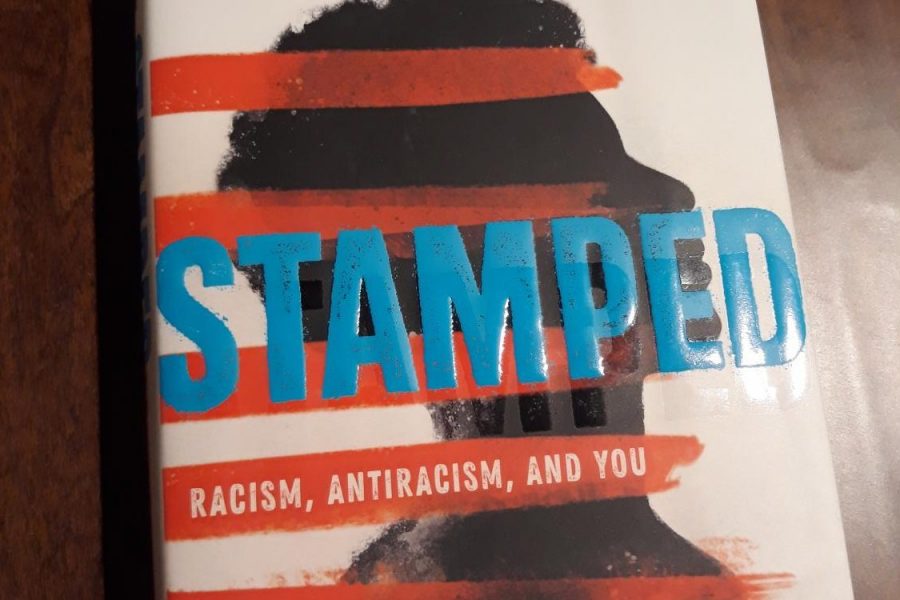Book Review: “Stamped – From the Beginning”
A Deep Examination of Racism in America
In “Stamped – From the Beginning”, authors Ibram X. Kendi and Jason Reynolds put racism in perspective.
October 16, 2020
Racism, from the COVID-19 pandemic in America where, according to NPR, African-Americans were disproportionately affected to death of George Floyd at the hands of Minneapolis police officers, is an unavoidable issue in the USA. But to comprehend our current racial climate, we must first examine its deep-rooted background. The book, “Stamped – From the Beginning” by Jason Reynolds and Ibram X. Kendi excels at doing just this, demonstrating how inaction can be just as disastrous as hatred in regards to civil rights.
“Stamped – From the Beginning” aims to educate its readers about racism using examples and anecdotes from the history books to emphasize the similarities between the past and future. The introductory chapter puts across the beginnings of racism in the colonial days of Europe, where royal Portuguese slave traders commissioned writer Gomes Eanes de Zurara to say how they were merely “fixing” the savages.
From here, the book presents three types of people that would spring up as a result: Antiracists, who are devoutly for equality of all people; segregationists, who are against equality; and assimilationists, who are for equality when the other group acts like them. Examples like Fredrick Douglass’ and Sojourner Truth’s writings about becoming like an educated white folk show how African-Americans have been forced to stand up and resist attitudes of different shades with the same intent – to disguise racism as the responsibility of African-Americans. Another clever thing about these three names is that it expresses how people who may not be aware of oppression are still, generally, contributing to it by not trying to stop it.
The book also succeeds in showing how racial progression is continually hampered by those in power. For every step forward, there are people who take two steps back: Andrew Johnson, the president after Lincoln, allowed “black codes” and Southern states to illegalize blacks from voting and Ronald Reagan’s War on Drugs caused a massive spike of black incarcerations and unemployment while spreading the rumor that they were simply lazy criminals who relied on welfare. As disgusting as it is, many of America’s famous figures contributed to prejudice that still continues to this day. A common theme of the book, and one of its major accomplishments, is its dedication to showing what wouldn’t be in the average history textbook.
One way the author’s presentation could be improved is of racism as primarily against African-Americans. This isn’t an entirely incorrect sentiment, as they have suffered the worst out of most races, brought into a barbaric slave trade and unjustly discriminated against in supposedly one of the world’s “greatest democracies” for decades. But when the book names the first racist as Gomes Eanes de Zurara with his writings on King John of Portugal’s slave trade in 1415, it omits the origin of race itself.
Race is defined as a group of people identified as distinct because of “supposed” physical or genetic traits shared as the group. Humans have used arbitrary and vague characteristics for thousands of years to separate classes. So there shouldn’t be a “first” racist, and the book should explain how natural human behavior plays a part. At best, it’s an oversimplification that we shouldn’t be taught.
Despite this, “Stamped – From the Beginning” is one of the best books to read up on if you want a quick, comprehensive history of racism in the U.S. and how we reached this point. Another good recommendation is the book “Stamped – From the Beginning” by solely Ibram X. Kendi, which this book is based on and is a far longer and sophisticated read into the various perspectives used to justify racism. The issue of racism will never truly go away, and the best we can do is educate ourselves about its presence.

![Posing with their UIL State Trophy, the Robolobos Van Halen Team beams with excitement after their win. “It was a team effort,” junior Noah Vo said. “I was happy because something happened in the first match and the match was also really close. So [when] they finally revealed it, I was pretty happy.” Photo courtesy of Amy Lovelace](https://cphswolfpack.com/wp-content/uploads/2025/05/IMG_0910-EDIT-1200x723.jpg)

![Broadcast, yearbook and newspaper combined for 66 Interscholastic League Press Conference awards this year. Yearbook won 43, newspaper won 14 and broadcast took home nine. “I think [the ILPC awards] are a great way to give the kids some acknowledgement for all of their hard work,” newspaper and yearbook adviser Paige Hert said. “They typically spend the year covering everyone else’s big moments, so it’s really cool for them to be celebrated so many times and in so many different ways.”](https://cphswolfpack.com/wp-content/uploads/2025/05/edited-ILPC.jpg)













![Bringing her arm over her head and taking a quick breath, junior Lauren Lucas swims the final laps of the 500 freestyle at the regionals swimming competition on date. Lucas broke the school’s 18-year-old record for the 500 freestyle at regionals and again at state with a time of 4:58.63. “I’d had my eye on that 500 record since my freshman year, so I was really excited to see if I could get it at regionals or districts,” Lucas said. “ State is always a really fun experience and medaling for the first time was really great. It was a very very tight race, [so] I was a bit surprised [that I medaled]. [There were] a lot of fast girls at the meet in general, [and] it was like a dogfight back and forth, back and forth.” Photo by Kaydence Wilkinson](https://cphswolfpack.com/wp-content/uploads/2025/03/Kaydence-2.7-23-edit-2.jpg)
![As the support team sits and poses for a photo in the cafeteria with the counseling team they eagerly wait to start their day. "We [all] seem to be a team, I get up every day and there's days where I don't want to go to work today, but I'm thankful that I have a job and I'm blessed to have what I have," Christopherson said. Photo Courtesy of Julie Weltens.](https://cphswolfpack.com/wp-content/uploads/2025/01/AF9E8470-10D7-4C91-BF28-EC8F86BAB66C-1200x852.jpeg)
![Officer Stephanie Cash is in her second year as an SRO at CPHS. “Seeing [students] grow over the years has been kind of cool,” Officer Cash said. “Freshmen that [are] all over the place and then in the next couple of years get a little more squared away and go to class and do work and start thinking about the future. Being a part of a student's growth is the best way to measure my success as an SRO.” Photo Courtesy of Cedar Park Police Department's PIO, Alicia Gallagher.](https://cphswolfpack.com/wp-content/uploads/2024/12/CPHS-SRO-900x1200.jpg)



![Taking a breath as he raises his arm up and out of the water, sophomore Kaden Padilla swims the 500 freestyle at the UIL state meet on Feb. 21-22. Padilla placed 10th overall and second in the consolation final in the event, dropping two seconds. “My family was there, so being able to drop time for them was really special,” Padilla said. “It was awesome [finding out I advanced to the consolation finals]. I wasn’t expecting it, and I was very surprised. My parents being there definitely made me a lot happier knowing they got to see me swim in finals.” Photo by Skyler King.](https://cphswolfpack.com/wp-content/uploads/2025/03/kaden-padilla.jpg)

![Three defenders try to stop senior point guard Hope Edwards before the ball leaves her hands. The girls basketball team faced Liberty Hill on Feb 21, losing 58-40. “[My season was] definitely bittersweet,” Edwards said. It's definitely sad [because] I'm gonna miss all my teammates, my coaches and just the whole CP environment.”](https://cphswolfpack.com/wp-content/uploads/2025/03/julia-128-1200x800.jpg)
































